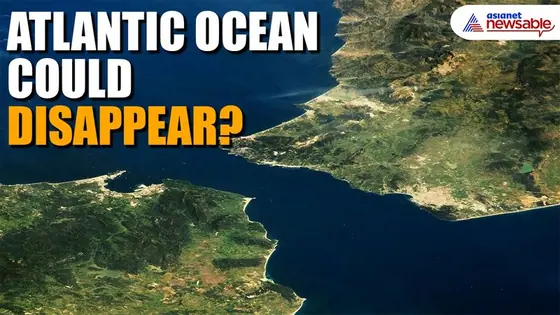
The Atlantic Ocean could be swallowed by terrifying 'Ring of Fire', claims new study (WATCH)
The subduction zone beneath the Gibraltar Strait, albeit currently inactive, poses a looming threat as it could extend over the next 20 million years, forming a new 'Ring of Fire' in the Atlantic.
The vast expanse of the Atlantic Ocean, a defining feature of our planet, may be facing a profound transformation, according to a recent study conducted by scientists in Portugal. Their findings suggest that a significant subduction zone, currently lying dormant beneath the Gibraltar Strait, could expand westwards into the Atlantic, potentially leading to the closure of this iconic ocean basin.

Led by Professor Joao Duarte from the University of Lisbon, the study sheds light on the mechanisms behind subduction zones – regions where one tectonic plate slides beneath another, often triggering powerful seismic activity. The subduction zone beneath the Gibraltar Strait, albeit currently inactive, poses a looming threat as it could extend over the next 20 million years, forming a new 'Ring of Fire' in the Atlantic.
The prospect of the Atlantic Ocean shrinking may seem distant, but it carries significant implications for both geological and human activities. Subduction zones are known for their seismic hazards, as evidenced by historic events like the devastating 1755 Great Lisbon Earthquake, which claimed thousands of lives and wreaked havoc in the region. Understanding the potential reactivation of the subduction zone beneath the Gibraltar Strait is therefore crucial for mitigating future seismic risks and ensuring preparedness.
The study's computer modeling predicts a gradual westward expansion of the subduction zone, ultimately leading to the formation of a new tectonic boundary within the Atlantic Ocean. This process could pull the ocean floor beneath, gradually diminishing the size of the Atlantic basin over millions of years.
While the idea of the Atlantic Ocean disappearing may seem like a distant prospect, the research underscores the dynamic nature of Earth's geological processes. As we navigate the complexities of our planet's evolution, continued scientific inquiry and preparedness are essential. Understanding the potential shifts in our oceans' landscapes not only deepens our appreciation of Earth's history but also equips us to confront the challenges of the future with resilience and foresight.